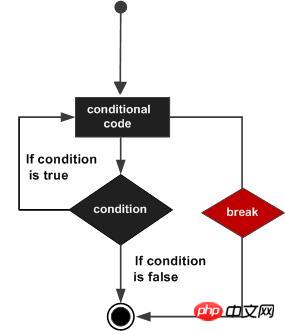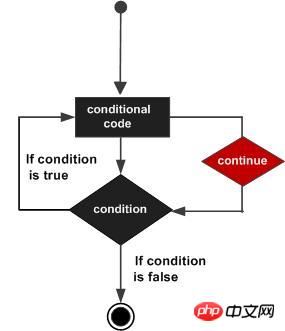
I believe everyone knows the python loop statement, and the countinue statement in python is used to change the flow of an ordinary loop. Typically, you loop through a piece of code until the condition is False. But sometimes, you may want to terminate the current iteration, or even the entire loop, without testing the judgment condition. In this case, you need to use continue and break. The two functions of continue and break are similar to skipping, but there is a big difference. Next, I will take you to understand the difference between these two statements and then analyze the examples of break and continue .
Both of these two statements have the function of terminating the loop statement, but they are also different to a certain extent.
1. The flow chart of the break statement is as follows:

(break statement Used to terminate the loop statement, that is, if the loop condition does not have a False condition or the sequence has not been completely recursive, it will also stop executing the loop statement. If you use nested loops, the break statement will stop executing the deepest loop and start executing the next line Code.) The syntax of
break is as follows:
break
The example is as follows:
#!/usr/bin/python
# -*- coding: UTF-8 -*-
for letter in 'Python': # 第一个实例
if letter == 'h':
break
print '当前字母 :', letter
var = 10 # 第二个实例
while var > 0:
print '当前变量值 :', var
var = var -1
if var == 5: # 当变量 var 等于 5 时退出循环
break
print "Good bye!"The output result is as follows:
当前字母 : P 当前字母 : y 当前字母 : t 当前变量值 : 10 当前变量值 : 9 当前变量值 : 8 当前变量值 : 7 当前变量值 : 6 Good bye!
2. The flow chart of the continue statement is as follows:

continue
#!/usr/bin/python
# -*- coding: UTF-8 -*-
for letter in 'Python': # 第一个实例
if letter == 'h':
continue
print '当前字母 :', letter
var = 10 # 第二个实例
while var > 0:
var = var -1
if var == 5:
continue
print '当前变量值 :', var
print "Good bye!"当前字母 : P 当前字母 : y 当前字母 : t 当前字母 : o 当前字母 : n 当前变量值 : 9 当前变量值 : 8 当前变量值 : 7 当前变量值 : 6 当前变量值 : 4 当前变量值 : 3 当前变量值 : 2 当前变量值 : 1 当前变量值 : 0 Good bye!
Python tutorial column on the php Chinese website.
The above is the detailed content of The difference between break and continue statements in python (example analysis). For more information, please follow other related articles on the PHP Chinese website!




